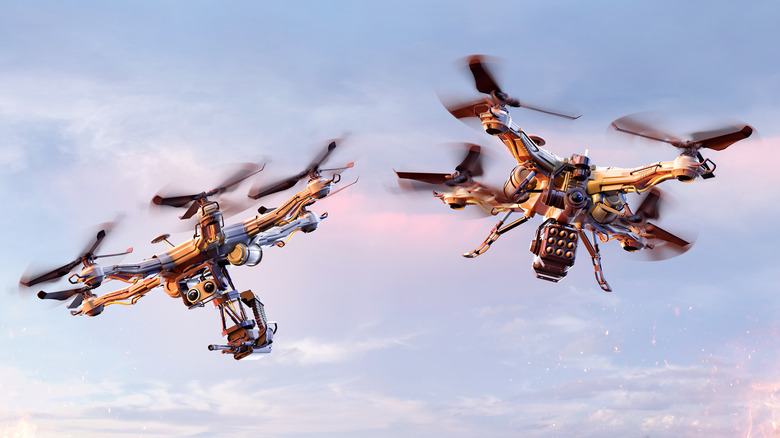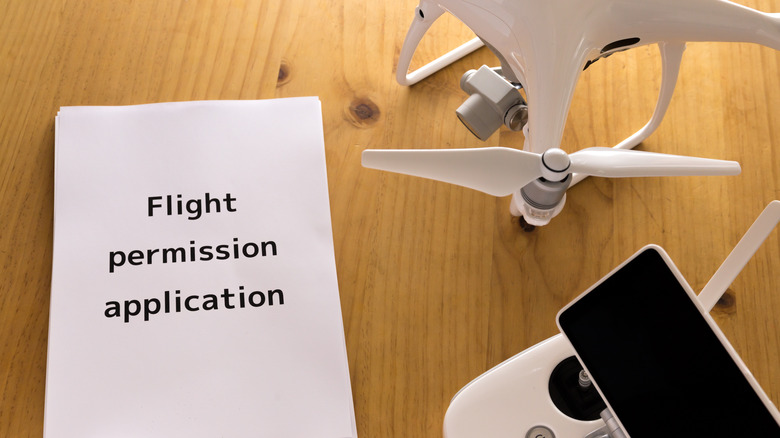Can You Attach A Weapon To Your Drone? Here's What The Law Says
In case you haven't seen the meme with comedian/actor Tracy Morgan (of "Saturday Night Live" and "30 Rock" fame) repeatedly saying the word "nope," here it is for your viewing pleasure because it's salient to this article.
@picmoplus Caption This 😂😂😂 #tracymorgan
The short answer to the question posited in the headline is exactly that — nope. And we deliver it with exactly the same boisterous incredulity because we shouldn't have to tell anyone that strapping anything onto a drone — whether it be fireworks, guns, bombs, or even the innocuous water balloon (although that might be fun) — is frowned upon by virtually every local, state, and federal agency in the continental United States.
As much as you want to think the best about your fellow human, the FAA has been warning citizens to stop attaching death-dealing devices on drones for years now. It's a case of taking a new-fangled technological marvel, essentially a grown-up's version of a kid's toy helicopter and making it "better" by turning it into a fireworks-delivering, chainsaw-carrying, pistol-packing, flame-throwing turkey cooker. Because ... 'Murica!
It's this very same "don't tread on me" attitude that won us our independence during the Revolutionary War, after all. While the question is a quintessential example of a rhetorical question (at least to most common sensical folk), humor us as we provide some compelling legal reasons that will keep you out of jail and save you money.
The FAA is not messing around
In October 2018, H.R. 302 (P.L. 115-254), known as the FAA Reauthorization Act of 2018, was signed into law. It was a bill that reauthorized several Federal Aviation Administration (FAA) programs like the Transportation Security Administration (TSA) and the National Transportation Safety Board (NTSB) through the Fiscal Year 2023.
Oddly, it also included protections for sports medicine professionals, assistance for communities hit by Hurricane Florence, and additional disaster recovery reforms. Another component of this comprehensive bill is section 363, entitled "Prohibition Regarding Weapons," which pertains to unmanned aircraft and systems.
The critical elements of this prohibition state that unless you have express permission from the FAA, no one is allowed to operate a drone that's strapped (the exact phrasing is "equipped or armed") with a dangerous weapon. It did not explicitly list off things like guns, bombs, chainsaws, fireworks, or flame throwers.
That's because the following line defines what a "dangerous weapon” is by referring to section 930(g)(2) of Title 18 of the United States Code, the main criminal code of the federal government of the United States. The USC drops the hammer, making it perfectly clear that it considers a "dangerous weapon" to be anything (well, almost anything) that could be used for or capable of "causing death or serious bodily injury." It even uses "animate or inanimate" in its tersely worded definition.
Leave the weapons at home
What's peculiar is that it doesn't consider "a pocket knife with a blade of less than 2.5 inches in length" to fall under this definition, so we assume it's perfectly fine to duct tape one to your drone. Go figure.
Last but certainly not least, the civil financial penalty for violating this ordinance will set you back $25,000. That's for each violation, and it's really just the tip of the proverbial iceberg, because you will most certainly face a litany of other local, state, and federal laws regarding weapons and hazardous materials that are separate from the specific laws binding drone operators. Jail time is almost certainly inevitable.
Of course, if you have legitimate reasons to attach a "dangerous weapon" to a drone in the course of your job — say as part of the ski patrol dropping bombs to mitigate avalanches or a parks and recreation department burning down vegetation with flame throwers in hard-to-reach areas — the FAA is most likely going to grant permission. But not before filling out the proper paperwork in an official capacity.
If you thought the law dropped off the books in 2023, not so fast. On February 8, 2024, Congress passed another five-year reauthorization of the bill (now referred to as the Reauthorization Act of 2023) that lasts through 2028. So all those folks rocking out YouTube videos of their exploits should reconsider posting what amounts to evidence: Your 15 minutes of fame could turn into a stretch of infamy that lasts much longer and costs a whole lot of money if something bad happens.


